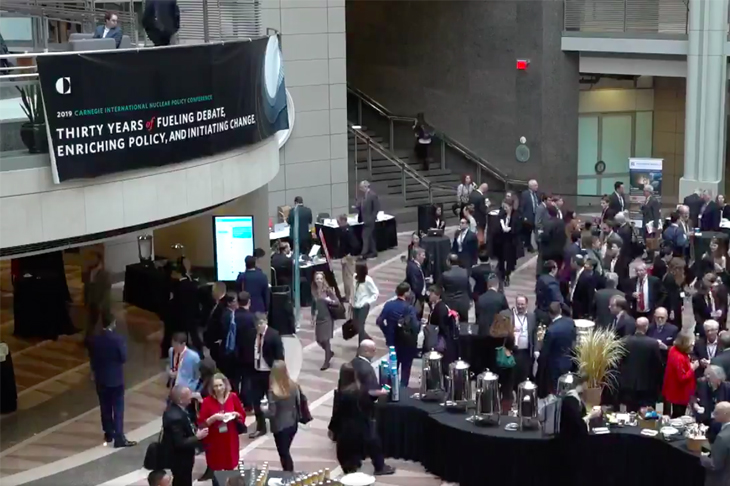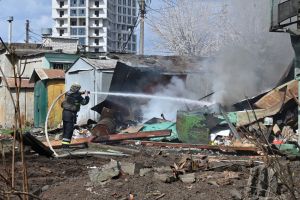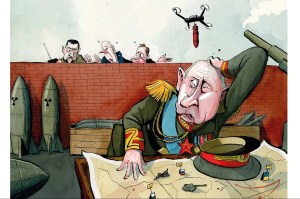‘This is not the Cold War redux; it is even worse than the Cold War.’ That’s how Nicolas Roche, of the French Ministry of Foreign Affairs, described the current climate around nuclear weapons.
Roche spoke at the Carnegie International Nuclear Policy Conference, a veritable Woodstock for the nuclear policy community (organizers insisted on referring to the shindig as ‘#NUKEFEST’), which convened for two days in Washington, DC. Despite the party-like atmosphere at ‘Nuke Fest’, despondency pervaded the gathering.
North Korea received substantial attention at the conference, while Iran and South Asia were relatively neglected. The dominant topic of conversation, and predominant reason for despair, was the US-Russia relationship.
From Crimea, to Syria, to the Mueller investigation on Capitol Hill, the signs of strain and enmity between the two nations are everywhere. But it is in the nuclear arena where the stakes are highest.
The two superpowers (perhaps former superpower, in the case of Russia), control 90 percent of the world’s supply of nuclear arms. The de-escalation of nuclear tensions has been a must for diplomats on both sides since the Cold War’s climax. The traditional manner of doing this has been through arms control treaties, limiting both nuclear stockpiles, as well as the means of delivering them. But that system lies on the brink.
On February 1, the United States suspended the Reagan-Gorbachev era Intermediate-Range Nuclear Forces Treaty, with Russia following suit the next day. As Mark Fitzpatrick, associate fellow at the International Institute for Strategic Studies, said at the conference, the INF Treaty’s collapse saw ‘a lot of experts draw the conclusion that strategic arms control is, if not dead, nearly so.’
‘I would actually push back on that assessment,’ replied the State Department’s Andrea Thompson. However, she did not defend the viability of the arms control system, choosing instead to defend the president’s withdrawal from the treaty. ‘The demise of the INF isn’t [the fault of] the Trump administration; the Russians violated this years ago. We’re finally upholding the standards and holding them accountable,’ Thompson said.
The West’s confidence in the Russians has been severely tested in recent years, and this has boded ill for bilateral arms control. Emily Haber, Germany’s Ambassador to the United States, pointed out that the arms control regime will be particularly difficult to salvage ‘because the basis that has triggered its erosion’ has been ‘the lack of trust.’ Just as the INF Treaty has failed, observers now believe the other arms control treaty, New START, will soon suffer a similar fate.
In the absence of trust, arms control negotiations have stalled. Russian officials at the conference consistently maintained that their American counterparts were unwilling to speak with them. ‘It is difficult to meet with officials from your administration,’ said Ambassador to the United States Anatoly Antonov. ‘The United States and Russia are sleepwalking towards nuclear disaster,’ warned former Foreign Minister Igor Ivanov.
The lack of dialogue comes at a pivotal time. Former senator Sam Nunn, known for his work on the disarmament of the former Soviet Republics, noted, ‘we are in an unprecedented period where we have no dialogue, but we have more reasons for dialogue then we probably ever had.
One crucial ongoing issue is the possibility of the use of ‘tactical’ nuclear weapons, which consist of ‘low-yield’ payloads that could be deployed on the battlefield in a conventional war, as opposed to ‘strategic’ nuclear weapons with the potential to wipe out a whole city.
US officials have long feared that, in the event that Russia found itself near defeat in a regional war, with enemy armies at the gates, their military might resort to a tactical nuclear strike against those opposing forces. The Russians, of course, deny such a possibility, with Ivanov claiming, ‘there is no first-strike concept in the Russian military,’ dismissing Americans’ fears as ‘a fairytale.’
Fairytale or not, this type of strike would present a terrible conundrum to US military planners. Would the US retaliate with a nuclear strike of its own? And if so, would it be of the tactical or strategic variety? Rep. Adam Smith, Chair of the House Armed Services Committee, replied, ‘if you use a nuclear weapon, we are going to respond and we are not going to be overly concerned about being, quote, proportional, unquote…a nuclear weapon is a nuclear weapon, and if you use it, we will nuke you, so don’t.’ In that spirit of fire-and-brimstone deterrence, Smith also suggested that the United States abandon its tactical nuclear weapons program, taking the ‘proportional’ response completely off the table.
Another area of concern is the advance of cybernetic technology. Sen. Nunn, who served in more straightforward times, was among the loudest voices to warn of such a threat, citing the possibility of hacking and third-party interference in that area, as well as the heightened risk of ‘war by blunder’ that such systems could bring. ‘This is the Wild West,’ Nunn said. ‘Not only are the cowboys with guns drawn in the saloon, but the horses are in the saloon too.’
It is a standoff, then, with a way out seeming elusive, and an absence of constructive dialogue. Laura Holgate, former US Ambassador to the IAEA, said that what she heard from Russian and American representatives had given her ‘less hope that there can be a common perspective between the US and Russian positions.’ A sense of pessimism shared by all at the conference, speaker and attendee alike: as Professor Togzhan Kassenova said, ‘that’s what coming to Nuke Fest does to you.’


















